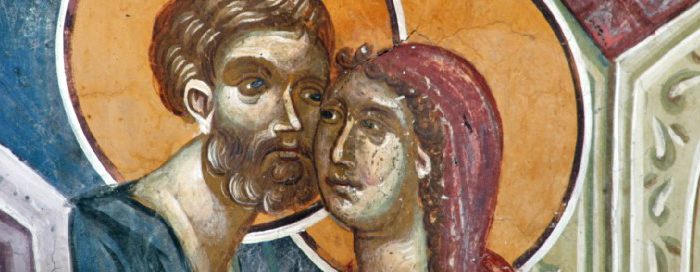This course is part of our ‘Open MA Module’ series. We are now accepting ‘external’ students who can follow and participate in these courses, just like the MA students but without enrolling on the MA Programme.

This postgraduate module/course is taught online by Dr Christoph Schneider. There will be 10 sessions taught online in real time, the duration of each session being 150 minutes. Apart from introductory lectures there will be plenty of time for discussion.
This module is a part of the MA in Christian Theology and the Contemporary World (taught by IOCS and the Cambridge Theological Federation, and awarded by Anglia Ruskin University) but it is also available to students of the MA in Spirituality East and West. ‘External’ students can follow and participate in the course just like the MA students, without being enrolled in one of the MA Programmes.
There are two enrolment options for the course participants who are not officially enrolled in the MA programme:
1. Auditors. These students participate in the classroom but cannot write an assignment at the end of the module. They do not receive credits for their participation in the course and consequently they cannot use their participation in this course to continue onto this IOCS MA course, or to enrol or transfer to another university. Auditors are expected to have good knowledge of English in order to follow this Module.
2. Affiliated students. These students participate in the classroom and will write an assignment (essay) which will be assessed properly at the end of the module. Consequently they receive credits which can then be used for continuing on with this MA course with IOCS, or they may carry over their credits to another university. Affiliated students are required to have a BA qualification or higher.
Module Leader: Dr Christoph Schneider
Teaching Timetable:
- Friday 15.00 – 17.30 (BST/GMT) – 16 May – 11 July (every fortnight)
- Friday 15.00 – 17.30 (BST/GMT) – 26 September – 21 November (every fortnight)
THE FEES FOR THIS COURSE ARE:
Auditors
Course fee – £230
Student fee – £100
IOCS Certificate/Diploma student fee – £30
Students of the Cambridge Theological Federation (CTF) and IOCS MA and PhD students are allowed to audit this course for free.
Affiliated students (receiving university credits)
Course fee – £1,366*
*Payment of this fee is to be made directly to Anglia Ruskin University, once the application has been accepted.
Application
To apply as Auditors please send a CV at info@iocs.cam.ac.uk. To apply as Affiliated Students please go to the Anglia Ruskin University application page here.
The course sessions are:
Session 1: Plato
Session 2: Maximus the Confessor
Session 3: Courtly Love
Session 4: Søren Kierkegaard
Session 5: Friedrich Nietzsche
Session 6: Vladimir Solovyov
Session 7: Max Scheler
Session 8: Pavel Florensky
Session 9: Anders Nygren
Session 10: Robert Spaemann
This module reflects on the mystery of Christian love. It looks at some of the most seminal thinkers in the history of theology and philosophy, focusing mainly on the 19th and 20th centuries. The module has an ecumenical character and examines love from a Catholic, Eastern Orthodox and Protestant perspective. It also analyses some of the most sophisticated critiques of Christian love and explores how theology can respond to these critiques. The module revolves around key concepts such as agapē, erōs and philia, and centres on the careful study of primary texts (in translations where not originally in English). Every session begins with an introductory lecture on the life and work of the author discussed in class that highlights the key ideas in the selected text. In the second half of the session there will be time for guided group discussion. The wide range of different texts will help you understand better what Christian love is all about.
The following questions will be addressed: What is the relationship between agapē, erōs and philia? How does Christian theology deal with the tension between preferential love (erotic love, friendship) and the demand for universal love (neighbour love)? Is reciprocity an intrinsic part of Christian love, or is the highest form of love unilateral? Does love occur spontaneously, or is it a virtue that needs to be acquired? In what way do different theological approaches influence our understanding of Christian love (e.g. the relationship between nature/creation and grace)?
For each session there will be reading and preparatory tasks assigned. These can be accessed via Moodle.
Please click here to find out more about our MA in Christian Theology and the Contemporary World
Please click here to find out more about our MA in Spirituality East and West.
Enrolment
Please select one of the options below:
